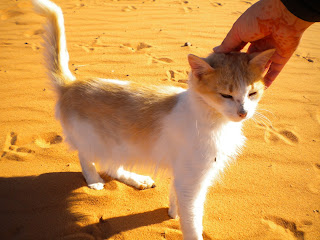Tomorrow morning at 6:45 I get on a plane in the tiny Rabat airport, a plane to take me home.
Today I packed up my life of the last 4 months into a 225 dirham suitcase from the souk that I'm not sure will make it all the way home.
I've been looking forward to going home for quite a while- home to see my family and friends, home to Christmas and all of the traditions that come with it, home to convenient consumerism and more equal gender relations. And of course, home to my cat.
What hasn't been following my dreams of home is the realization that in order to go home, I have to leave here. I can't put into words how strange it will be to not wake up tomorrow morning, eat breakfast with my roommate, catch a cab to AMIDEAST, and spend the day in classes and our little study-abroad-students-only room at the top of the program building. Strange to not see and hear cats everywhere in the streets, or the call to prayer 5 times a day. Strange to not dig around in my purse for a few dirham for the Malian and Mauritanian refugees with small children who sit on the streets on warm days. Strange to not go down to the hanut for chicken chips, or to a salon de the for a coffee and a crepe, or to be ordered to "kul!" constantly at every meal shared with my host mom. Strange to think that this was normal.
I didn't go through this on my way here because I was heading off into some great adventure, where I knew I'd be leaving "normal" at home.
But in the time that I built a new normal, I also built an interesting relationship with Morocco. I feel like I haven't been here long enough, but at the same time I know I wouldn't want to live here indeterminately. I fell in love with the mountains and I enjoyed the desert. I feel at home in Rabat but I'm not much of a fan of Tangier or Marrakech. I want to come back, but at the same time there are so many other places I want to see. I'm getting nostalgic, and I know that I'm wearing a lovely pair of rose-colored glasses because I'm leaving. But I know that there are parts of Morocco I'll always love and always miss. I know that being here has given me so much more perspective, and I know that the parts I love will always stay with me.
Well, here we go.
Today I packed up my life of the last 4 months into a 225 dirham suitcase from the souk that I'm not sure will make it all the way home.
I've been looking forward to going home for quite a while- home to see my family and friends, home to Christmas and all of the traditions that come with it, home to convenient consumerism and more equal gender relations. And of course, home to my cat.
What hasn't been following my dreams of home is the realization that in order to go home, I have to leave here. I can't put into words how strange it will be to not wake up tomorrow morning, eat breakfast with my roommate, catch a cab to AMIDEAST, and spend the day in classes and our little study-abroad-students-only room at the top of the program building. Strange to not see and hear cats everywhere in the streets, or the call to prayer 5 times a day. Strange to not dig around in my purse for a few dirham for the Malian and Mauritanian refugees with small children who sit on the streets on warm days. Strange to not go down to the hanut for chicken chips, or to a salon de the for a coffee and a crepe, or to be ordered to "kul!" constantly at every meal shared with my host mom. Strange to think that this was normal.
I didn't go through this on my way here because I was heading off into some great adventure, where I knew I'd be leaving "normal" at home.
But in the time that I built a new normal, I also built an interesting relationship with Morocco. I feel like I haven't been here long enough, but at the same time I know I wouldn't want to live here indeterminately. I fell in love with the mountains and I enjoyed the desert. I feel at home in Rabat but I'm not much of a fan of Tangier or Marrakech. I want to come back, but at the same time there are so many other places I want to see. I'm getting nostalgic, and I know that I'm wearing a lovely pair of rose-colored glasses because I'm leaving. But I know that there are parts of Morocco I'll always love and always miss. I know that being here has given me so much more perspective, and I know that the parts I love will always stay with me.
Well, here we go.




















































